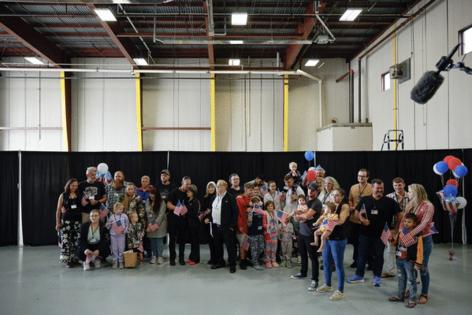Expedited South African refugees to resettle in Idaho under Trump order
Published in News & Features
BOISE, Idaho — A plane carrying dozens of South Africans claiming to face anti-white discrimination landed in the United States on Monday. Nine will be resettled in Idaho as refugees, making them some of the only refugees to the state since President Donald Trump ordered pauses in January.
Nearly 50 Afrikaners — a term that refers to South Africans descended from Dutch settlers — were flown on a U.S.-funded charter plane, as part of a Trump decision, that landed at Washington Dulles International Airport on Monday morning.
The move meant the Trump administration prioritized the South Africans ahead of about 12,000 already approved refugees, including more than 400 who had been poised to resettle in Idaho this year, according to the Idaho Office for Refugees. A January executive order brought their hopes to a screeching halt, despite some of them being so far along in the process that they already had plane tickets to Boise.
Only a handful of refugees who had an approved Special Immigrant Visa for helping the U.S. military have entered Idaho since the order, according to the Idaho Office for Refugees.
The Idaho Office for Refugees, the nonprofit designated to oversee the resettlement program for Idaho, confirmed that nine of the South Africans would be resettling in Twin Falls. The U.S. Committee for Refugees and Immigrants will assist them.
“USCRI has provided services to refugees and immigrants for over 100 years, and we’ll continue to do our part regardless of country of origin,” Eskinder Negash, USCRI president and CEO, said in an emailed statement. “We are hopeful that the arrival of this group of refugees indicates the government’s intention to restart the U.S. refugee program and help other refugees in need of resettlement services.”
Trump and Elon Musk — a South African immigrant — have accused the country’s government in Pretoria, which is Musk’s hometown, of instituting anti-white laws and policies, and fueling violence against white landowners in the nation that for decades was the home of apartheid.
But others have argued that their claims focused on a relatively small number of farm attacks and don’t line up with data, and the South African government has disputed Trump’s comments. Police data showed that of the 225 people killed on South African farms between April 2020 and March 2024, 101 were workers living on farms — most of them Black — while 53 victims were farmers, who are usually white, according to The New York Times.
“It is most regrettable that it appears that the resettlement of South Africans to the United States under the guise of being ‘refugees’ is entirely politically motivated and designed to question South Africa’s constitutional democracy,” Chrispin Phiri, a spokesman for South Africa’s foreign ministry, said in a statement to The New York Times.
South African applications expedited
The prioritization and expedition of the South Africans was a departure from the Trump administration’s largely anti-refugee stance.
The Afrikaners will receive services that are currently halted for other refugees, according to NPR. Shortly after the resettlement program pause, the administration froze funding that provides refugees with crucial services to assist with finding housing, jobs and schools.
Lisa Meierotto, a Boise State University global studies professor who focuses on immigration, described the move as “unprecedented,” noting that the South Africans underwent a different process than most refugees in their positions.
The State Department said it received more than 8,000 resettlement inquiries since March following Trump’s February order halting aid to South Africa and promoting “the resettlement of Afrikaner refugees escaping government-sponsored race-based discrimination.”
Refugees are typically people who flee to another country to escape dangers in their homeland, Meierotto explained. The person will apply to the global refugee system from that second country. Another country in that system, which includes the United States, can then agree to help resettle that person within its borders.
Meierotto said the entire procedure often takes more than seven years.
“It’s a lengthy, lengthy, difficult process,” Meierotto told the Idaho Statesman by phone.
Other Idaho-bound refugees in limbo
The Idaho Office for Refugees has seen firsthand how Trump’s pause has left people in limbo, according to spokesperson Holly Beech.
“We had a family in Boise, for instance, whose loved ones were displaced from Syria and were living in Egypt,” Beech said. “They were supposed to come in February, and that got canceled for them.”
Beech recalled another local resident who recently had a loved one killed in the Democratic Republic of Congo.
Yasmin Aguilar, a 55-year-old Boise resident and former doctor from Afghanistan, came to Idaho as a refugee in 2000 after she was kidnapped and attacked by the Taliban.
Aguilar has been hoping her brother and sister’s families would be able to join her. They are still waiting for their resettlement to move forward, despite the U.S. government approving their applications in 2017. They, too, fled the Taliban and are now living in Pakistan, but Aguilar worries they could be deported back at any time.
“Safety is the biggest issue,” Aguilar said. “We all know what’s happening in Pakistan right now, with India and bombings. Believe me, I cannot even sleep. I have nightmares. After many years of processing, background checks and everything, it’s so painful that you’re still not with your family.”
Meierotto pointed out that the Trump administration claimed it paused the resettlement program because the United States didn’t have the capacity to take in refugees.
“This most recent group coming from South Africa indicates ... there is capacity,” Meierotto said. “They were able to charter a plane. They were able to expedite all of the paperwork. And so I guess the question is: Will we see that sort of expedited process now that there’s proof that they’re able to do this? What will this mean for these 12,000 people who are in limbo?”
_____
©2025 The Idaho Statesman. Visit idahostatesman.com. Distributed by Tribune Content Agency, LLC.







Comments